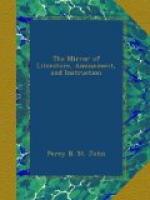And now let us look a little to facts: in all ages of the world those have ever been the most savage nations which observed an animal diet. Thus the Tartars, the Ethiopians, the Scythians, and the Arabians, who live wholly on animal food, possess that ferocity of mind and fierceness of character, common to carnivorous animals, while the vegetable diet of the Brahmins and Hindoos gives to their character a gentleness and mildness directly the reverse; potatoes, chestnuts, &c. satisfy the wants of the Alpine peasant, and there are numerous, harmless tribes, who feed solely on vegetables and water. Even Homer in his time has made the Cyclops, who were flesh eaters, horrid monsters of men, and the Lotophagi, he has described as a people so amiable, that when strangers had once become acquainted with them, and tasted the fruits on which they lived, they even forgot their native country to take up their abode with their hosts. But in those civilized countries where animal food is commonly eaten, it must follow that the lower orders, who compose the great majority of the population, cannot partake of it in any great quantities; now it does not appear that the rich enjoy better health from this luxurious mode of living, or that the poor are less healthy from the want of it; on the contrary, the wealthier classes are subject to many chronic and other disorders arising from their aliment, and they have a very large body of physicians, who subsist by a constant attendance on them, while on the other hand, those in the lower walks of life are seldom out of health, owing to their more simple and less injurious mode of living; they suffer only from accident and natural disease, and, generally speaking, when they are attacked, it proves their first and last illness. Moreover, as the poor are more at ease while they live, so too experience shows that they live longer; cases of longevity are very rare with those in affluent circumstances, while most of the famous instances on record of persons arriving at extraordinary old age, have been peasants, fishermen, &c.




